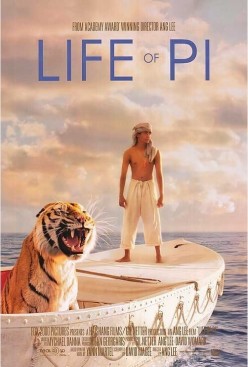
 First a warning: It seems that there are a lot of parents who have heard that Life of Pi (IMDB) is about a boy named Pi and a tiger named Richard Parker, and are therefore assuming that this must be a heartwarming family film and are taking their four-year-olds to see it. Some people may indeed feel that the ending is heartwarming but this tiger is no Disney tiger and some of the scenes are highly questionable for young children.
First a warning: It seems that there are a lot of parents who have heard that Life of Pi (IMDB) is about a boy named Pi and a tiger named Richard Parker, and are therefore assuming that this must be a heartwarming family film and are taking their four-year-olds to see it. Some people may indeed feel that the ending is heartwarming but this tiger is no Disney tiger and some of the scenes are highly questionable for young children.
It would be better to think of this as a philosophical movie with terrific visual images. Sort of like The Tree of Life–except that Life of Pi makes that movie seem rather trite and predictable by comparison.
There is a framing story in which the adult Pi (Irrfan Khan) recounts his story to Yann Martel (Rafe Spall), the author of the novel. This immediately raises the question of whether Pi is a reliable narrator. Is he telling what really happened or is he spinning a tall tale? Much of what we see feels like it could really have happened but the direction the story takes toward the end will raise eyebrows.
The story starts with Pi’s childhood, growing up in India as the son of a zoo owner, and thus familiar with wild animals. The young Pi (Gautam Belur) was fascinated by religion. He was raised as a Hindu by his mother (Tabu) but was fascinated by Christianity and Islam and wanted to convert to both, much to the annoyance of his ultra-rationalist father (Adil Hussain).
In the central part of the story the family decides to move to Canada and the teenaged Pi (Suraj Sharma) ends up traveling with them on a freighter along with many of the zoo animals. The ship sinks and he ends up in a lifeboat with the aforementioned Bengal Tiger. After that things start to get strange and amazing and I won’t attempt to describe what happens.
One quibble: the freighter is supposed to be a Japanese ship called the “Tsimtsum.” There’s no way that could be right. Not only does that not mean anything in Japanese but you can’t even write it using Japanese characters. Possibly it’s supposed to be a reference to tzimtzum, a very obscure Kabbalic concept.

